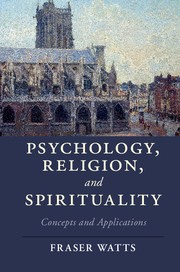Book contents
- Frontmatter
- Dedication
- Contents
- Preface
- 1 Concepts and Approaches
- 2 Psychoanalysis
- 3 Genetics and Evolution
- 4 Brain and Cognition
- 5 Religious Experience
- 6 Religious Practices
- 7 Religious Beliefs and Thinking
- 8 Spirituality
- 9 Developmental Aspects
- 10 Varieties and Types
- 11 Health and Adjustment
- 12 Personal Transformation
- 13 Scripture and Doctrine
- 14 Human Nature and Personality
- 15 Summing-Up
- Further Reading
- References
- Index
12 - Personal Transformation
Published online by Cambridge University Press: 31 March 2017
- Frontmatter
- Dedication
- Contents
- Preface
- 1 Concepts and Approaches
- 2 Psychoanalysis
- 3 Genetics and Evolution
- 4 Brain and Cognition
- 5 Religious Experience
- 6 Religious Practices
- 7 Religious Beliefs and Thinking
- 8 Spirituality
- 9 Developmental Aspects
- 10 Varieties and Types
- 11 Health and Adjustment
- 12 Personal Transformation
- 13 Scripture and Doctrine
- 14 Human Nature and Personality
- 15 Summing-Up
- Further Reading
- References
- Index
Summary
This chapter will be devoted to the relationship of religion to personal change and transformation. We will look at both how and why people change when they opt in or out of religion and at how ongoing engagement with religion can contribute to personal growth and well-being.
Conversion
Joining and leaving religion provide an interesting opportunity to study the effects of religion on personality and adjustment. It was a major topic in the early years of the psychology of religion in the late nineteenth and early twentieth centuries, though with a rather restricted focus on conversion as it occurred in American Protestant Christianity. There was a particular fascination with the sudden conversions of “born-again” Christians, and St. Paul's experience on the road to Damascus was taken as the paradigm of religious conversion. More recent work on conversion has been done more by sociologists than psychologists, and it has had a particular focus on people joining and leaving new religious movements (see Hood et al., 2009, chap. 8).
Despite the restricted focus of early work on conversion, we have inherited from it some useful conceptualizations. George Coe defined conversion as (i) a transformation of self (ii) that comes about through some definite process, not just maturation; (iii) has radical consequences (iv) in a higher direction; and (v) occurs in a social context (Coe, 1916). That definition would still be widely accepted. Distinctions were made in this early work between once-born and twice-born Christians and between sudden and gradual conversion types, and it was recognized that different conversion types had different correlates.
More recently, Lewis Rambo (1993) developed a stage model of conversion that moves through (i) the personal and social context in which conversion occurs, (ii) a crisis that destabilizes the person's previous religious identity, (iii) the quest through which he or she seeks for alternatives, (iv) an encounter where he or she meets someone who presents an alternative, (v) an interaction with a new religious community, (vi) an act of commitment of joining a new religious community, and (vii) the outcome of finding whether or not it meets his or her needs. It is a welcome feature of this model that it recognizes the complex and interactional nature of conversion.
- Type
- Chapter
- Information
- Psychology, Religion, and SpiritualityConcepts and Applications, pp. 149 - 159Publisher: Cambridge University PressPrint publication year: 2017



